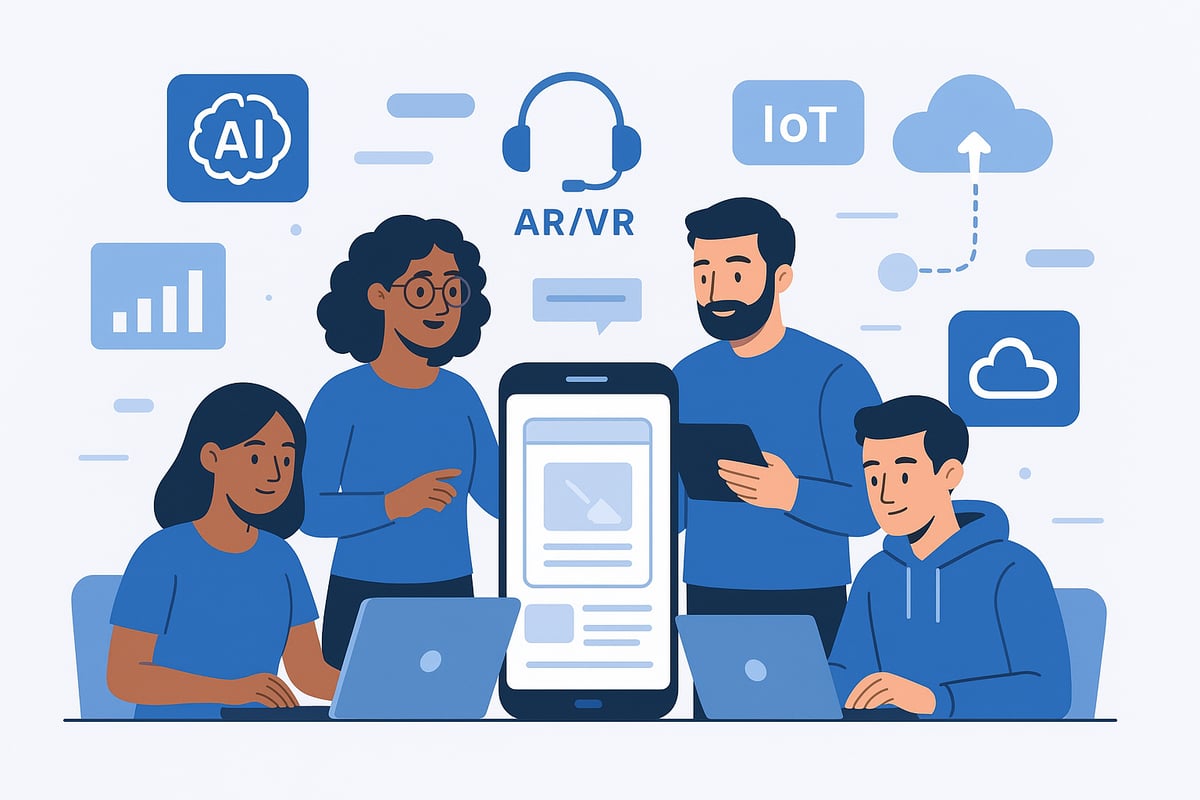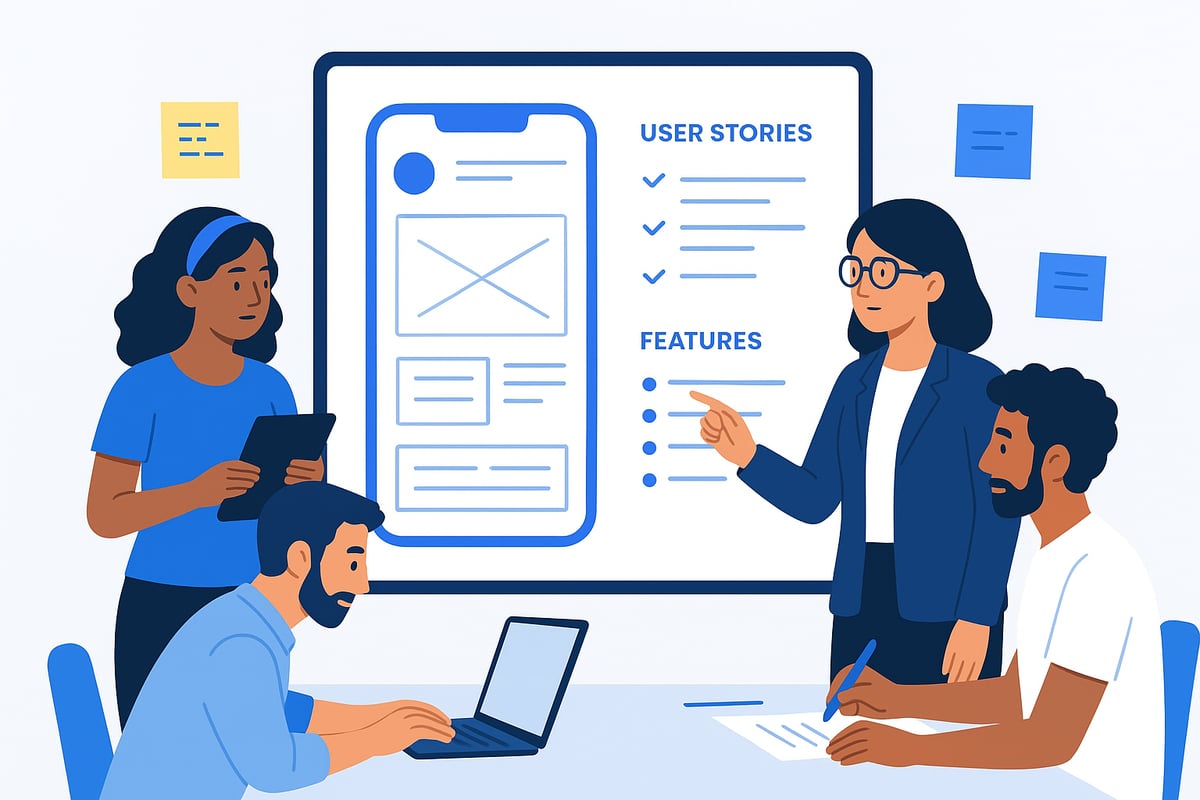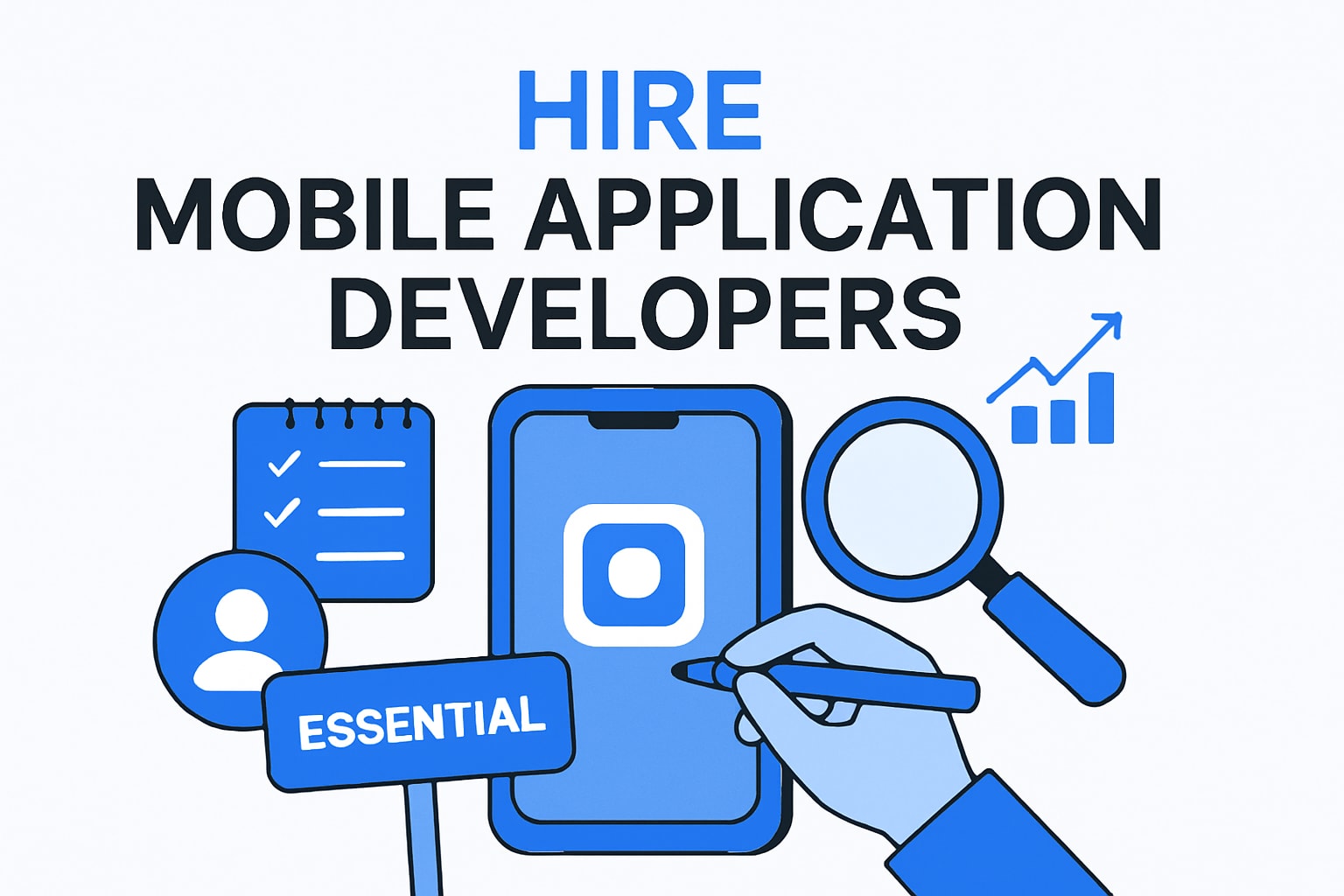Mobile app usage is reaching new heights in 2025, creating an environment where every business is racing to stand out. With so many brands competing for user attention, delivering a seamless, innovative digital experience has become a must.
Yet, the process to hire mobile application developers is more complex than ever. Fast-changing technologies, evolving user expectations, and a competitive talent market make it challenging to find the right fit.
This guide breaks down every step you need: from sourcing and evaluating candidates to onboarding and managing your team. Discover data-driven strategies, proven frameworks, and actionable tips to ensure your app project succeeds in today’s dynamic landscape.
Understanding the 2025 Mobile App Development Landscape
The mobile app landscape in 2025 is more dynamic and competitive than ever. For businesses aiming to hire mobile application developers, understanding the current trends, platforms, and hiring challenges is essential to making informed decisions. Let’s break down the key factors shaping this market.

Evolving Market Trends and Statistics
The demand for mobile apps is skyrocketing, with global revenues projected to exceed $613 billion in 2025, according to global mobile app revenue projections for 2025. This explosive growth means businesses must hire mobile application developers who can deliver high-quality, innovative solutions.
Cross-platform frameworks are becoming the norm, enabling faster launches and cost savings. As a result, the ability to hire mobile application developers skilled in tools like Flutter and React Native is now a priority for many companies.
AI, AR/VR, and IoT features are increasingly expected in modern apps. Businesses that hire mobile application developers with expertise in these areas can set their products apart. For example, TikTok’s rapid scaling was fueled by recruiting top-tier developers who could integrate advanced algorithms and handle massive user loads.
Remote and hybrid work models have also expanded the talent pool. Companies can now hire mobile application developers from around the globe, increasing access to specialized skills while navigating new challenges in team management and collaboration.
Key Mobile Platforms and Technologies
Choosing the right platform is crucial when you hire mobile application developers. In 2025, iOS and Android continue to dominate, but their user demographics and market shares vary by region. This impacts both the technical strategy and the recruitment process.
Here’s a quick comparison:
| Platform | Market Share (2025) | Popular Languages/Frameworks |
|---|---|---|
| iOS | 28% | Swift, Objective-C |
| Android | 71% | Kotlin, Java |
| Cross-Platform | Growing | Flutter, React Native, Dart |
Developers with experience in cloud-based backends and serverless architectures are in high demand, as these technologies offer scalability and reliability. Security is non-negotiable, especially for industries like fintech. Companies that hire mobile application developers with a track record in GDPR and CCPA compliance, as well as expertise in secure coding practices, gain a significant advantage.
Fintech apps, for instance, often select developers based on their ability to implement robust authentication, encryption, and data protection measures. This focus on security ensures both regulatory compliance and user trust.
Challenges Facing Businesses in Hiring Developers
Despite the expanded talent pool, companies still face major challenges when they hire mobile application developers. Talent shortages are driving up salaries and making it harder to secure experienced professionals.
Global hiring introduces both opportunities and hurdles. While businesses can access diverse skills by hiring internationally, they must also manage time zones, contracts, and compliance with local laws.
Retaining top talent is another ongoing issue. High competition means developers are often approached with lucrative offers. Startups, in particular, may struggle with developer churn, as talented individuals are lured away by larger firms or more exciting projects.
To overcome these obstacles, companies must refine their hiring strategies, offer competitive packages, and foster engaging work environments. Success in 2025 will depend on the ability to hire mobile application developers who not only have the right skills, but also align with the company’s mission and culture.
Defining Your Mobile App Project Requirements
A successful app starts with crystal-clear requirements. Before you hire mobile application developers, you need a strong foundation. Without this groundwork, projects often face costly delays, unclear goals, or misaligned expectations. Getting your requirements right sets the stage for a smooth hiring process and a winning product.

Clarifying Business Goals and App Objectives
Every app must serve a purpose. Begin by asking: What business goals will the app achieve? Define your target users, core features, and desired outcomes. Aligning app objectives with your overall strategy ensures that your investment delivers measurable impact.
For example, startups often validate their app ideas through market research or MVP launches before they hire mobile application developers. This way, they avoid building unnecessary features and stay focused on what truly matters.
List your primary goals:
- Increase customer engagement
- Streamline internal operations
- Generate new revenue streams
Prioritizing objectives helps you communicate needs clearly to developers and stakeholders.
Determining Technical Scope and Stack
Choosing the right technical approach is crucial. Decide whether you need native, cross-platform, or hybrid development. Each option affects cost, speed, and the talent you need to hire mobile application developers for.
Key considerations:
- Which platforms (iOS, Android, both) will you target?
- What integrations are essential (APIs, payment gateways, analytics)?
- Is scalability or modularity a priority?
Enterprises may choose microservices for future-proofing, while startups often prefer a lean stack for faster launches. For a deeper dive into the process to hire mobile application developers and select the right stack, see this How to hire a mobile app developer guide.
Budgeting and Timeline Planning
Budget and timing shape every project decision. The cost to hire mobile application developers in 2025 will vary by region, engagement model, and skill level. In-house teams offer control but come with higher salaries and overhead. Freelancers and agencies can be more flexible, yet may require extra management.
Average costs (2025 estimates):
| Model | Cost Range (USD) | Typical Timeline |
|---|---|---|
| In-House | $80k–$150k/year | 6–12 months |
| Freelance | $40–$100/hr | 3–9 months |
| Agency | $30k–$250k+ | 2–8 months |
Balance speed, quality, and cost. Underestimating timelines or budgets often leads to missed launches or rushed results. Plan with buffers to avoid surprises as you hire mobile application developers.
Building a Project Specification Document
A well-crafted specification guides your team from start to finish. Include user stories, wireframes, feature lists, and technical requirements. Clear documentation makes it easier to hire mobile application developers who understand your needs from day one.
Recommended tools:
- Figma for wireframes and UI mockups
- Jira or Confluence for task tracking and documentation
Sample brief for an e-commerce app:
- User stories: "As a customer, I want to filter products by price."
- Feature list: Product catalog, cart, secure checkout
- Technical requirements: Payment gateway integration, GDPR compliance
With a strong project spec, you minimize miscommunication and speed up onboarding once you hire mobile application developers.
Essential Skills and Qualities to Look for in Mobile App Developers
Hiring the right people is crucial in today’s fast-moving digital world. When you set out to hire mobile application developers, understanding which skills and qualities matter most can make or break your project. Let’s break down the essentials every business should look for in 2025.

Technical Proficiency and Experience
When you hire mobile application developers, technical expertise is the foundation. Top candidates excel in:
- Core languages: Swift for iOS, Kotlin and Java for Android, Dart for Flutter, JavaScript and TypeScript for cross-platform.
- Familiarity with up-to-date SDKs, APIs, and libraries.
- Hands-on experience with CI/CD pipelines and automated testing.
Strong developer portfolios often showcase complex app builds, with real-world examples of scalability or unique integrations. For more on which technical skills are most in demand, check out the Essential skills for mobile app developers in 2025.
Problem-Solving and Innovation
Businesses that hire mobile application developers need problem solvers, not just coders. Developers should be able to translate business needs into robust technical solutions.
Look for candidates who:
- Demonstrate creative thinking in past projects.
- Have a track record of iterative improvement.
- Can optimize app performance, like reducing crash rates or improving load times.
For example, a developer who helped lower crash rates by 30 percent shows the kind of proactive approach that sets apart high performers.
Communication and Collaboration Skills
When you hire mobile application developers for remote or hybrid teams, strong communication is essential. Developers must clearly explain technical concepts to non-technical stakeholders and collaborate seamlessly with designers, project managers, and QA testers.
Agile methodologies are often used to boost collaboration. Teams practicing Agile tend to deliver projects more smoothly and adapt quickly to changes in project scope.
Adaptability and Learning Agility
The tech landscape shifts rapidly, so businesses must hire mobile application developers who are adaptable and eager to learn. Developers should:
- Stay current with emerging technologies like AI, AR/VR, and blockchain.
- Show willingness to master new frameworks as project needs change.
- Display a history of upskilling, such as moving from native to cross-platform environments.
This adaptability ensures your team can respond to future trends and evolving project requirements.
Cultural Fit and Work Ethic
Beyond technical skills, it’s critical to hire mobile application developers who align with your company’s culture and vision. Look for:
- Strong work ethic and reliability.
- Openness to feedback and ability to handle high-pressure situations.
- Shared values and commitment to long-term goals.
A developer who becomes a long-term asset is one who not only delivers great code but also contributes positively to your team’s spirit and success.
Where and How to Source Top Mobile Application Developers in 2025
Finding the best way to hire mobile application developers in 2025 is more strategic than ever. The market is global, remote work is the norm, and specialized agencies are changing the game. Let’s break down your options and help you choose the right sourcing path for your next mobile app project.

Popular Sourcing Channels and Platforms
The first step to hire mobile application developers is knowing where top talent is found. In 2025, tech-focused job boards like Stack Overflow, GitHub Jobs, and AngelList remain favorites for direct hires. Freelance marketplaces such as Upwork, Toptal, and Fiverr Pro offer flexibility for short-term or specialized projects.
Specialized recruitment agencies and vetted talent networks are ideal for accessing prescreened developers. These platforms streamline the process, reducing your time-to-hire. For a deeper look at how to effectively use these channels, check out this Guide to custom application developers.
Here’s a quick comparison:
| Platform Type | Best For | Example Sites |
|---|---|---|
| Job Boards | Direct hires | Stack Overflow, AngelList |
| Freelance Marketplaces | Flexible, project-based | Upwork, Toptal, Fiverr Pro |
| Recruitment Agencies | Vetted, fast placement | Toptal, Gun.io |
Remember to tailor your sourcing strategy to your company’s needs and the specific demands of your app project.
Leveraging Global and Remote Talent
Remote work trends have opened doors to a vast pool of international developers. When you hire mobile application developers globally, you gain access to diverse skills, often at a lower cost. Teams can work around the clock, boosting productivity.
However, global hiring brings legal and compliance considerations. You’ll need clear contracts, an understanding of tax regulations, and a plan for managing time zones. Many companies use collaboration tools like Slack and Jira to keep remote teams aligned.
A SaaS company, for example, successfully scaled by building a distributed team across three continents. They found that hiring globally allowed them to tap into niche expertise not available locally.
Evaluating In-House vs. Outsourcing vs. Hybrid Teams
Choosing how to hire mobile application developers often comes down to three models: in-house, outsourcing, or a hybrid approach.
- In-house: Offers full control and cultural alignment but can be expensive and slow to scale.
- Outsourcing: Provides cost savings and access to global talent, though you may sacrifice some control.
- Hybrid: Combines the strengths of both, letting you scale flexibly while keeping core knowledge internal.
Startups may lean toward outsourcing for speed and cost reasons, while enterprises might prefer the stability of in-house teams. Use a hybrid model to keep strategic roles internal and outsource specialized tasks.
A recent case study showed a fintech startup reduced costs by 40% and accelerated launch timelines by mixing in-house leadership with outsourced development.
Utilizing No-Code and AI-Driven Agencies
If you need to hire mobile application developers for rapid prototyping or MVPs, no-code and AI-driven agencies are a smart solution. These agencies build apps up to five times faster and cut costs by three to four times compared to traditional methods.
Big House Technologies, for instance, specializes in scalable no-code and AI-powered app development. They offer services including end-to-end app builds, AI integration, UI/UX design, and workflow automation. Their flexible pricing and proven track record make them a top choice for startups, SMEs, and enterprises seeking speed and cost efficiency.
Non-technical founders especially benefit from these platforms, as they can launch MVPs in weeks without needing to hire mobile application developers with traditional coding skills.
The Step-by-Step Process to Hire Mobile Application Developers
Hiring the right talent is a multi-stage journey. To successfully hire mobile application developers in 2025, you need a structured approach that covers everything from the job description to onboarding. Here’s a practical, step-by-step framework to help you navigate each phase with confidence.
Step 1: Crafting a Compelling Job Description
Start with a clear, engaging job post that attracts top talent. To hire mobile application developers effectively, outline the project scope, required skills, responsibilities, and your company’s culture. Use specific language to highlight must-have technical proficiencies, frameworks, and expected deliverables.
Here’s a simple template for a high-converting job post:
**Position:** Mobile App Developer
**Tech Stack:** Flutter, Swift, Kotlin, REST APIs
**Responsibilities:**
- Build and maintain scalable mobile apps
- Collaborate with designers and PMs
- Ensure code quality and security compliance
**About Us:**
We value innovation, transparency, and teamwork.
For more on what makes a job post stand out, explore App and software development insights.
Step 2: Sourcing and Shortlisting Candidates
To hire mobile application developers, leverage a mix of sourcing channels. Post your openings on tech job boards, tap into freelance platforms, and engage with talent networks. Evaluate candidates by reviewing portfolios, GitHub repositories, and coding challenge results.
A quick comparison table for sourcing options:
| Platform | Ideal For | Validation Tools |
|---|---|---|
| Stack Overflow | Experienced devs | Q&A, profiles |
| Upwork/Toptal | Freelancers/contract | Portfolios, reviews |
| AngelList | Startup-minded talent | Startup profiles |
Stay up to date on trends with Cross-platform development impact on hiring, which covers strategies for a changing talent landscape.
Step 3: Conducting Technical Interviews and Assessments
The next step to hire mobile application developers is a rigorous technical interview process. Structure interviews with a mix of technical questions, live coding, and take-home assignments. Use platforms like HackerRank or Codility for objective assessment.
Consider a scenario-based task, such as:
# Sample: Optimize this function for better app performance
def fetch_user_data(user_id):
# Simulate slow database call
time.sleep(5)
return db.get(user_id)
Assess how candidates solve real-world problems, communicate their approach, and demonstrate proficiency in your chosen stack.
Step 4: Evaluating Soft Skills and Cultural Fit
Beyond technical skills, you need to hire mobile application developers who fit your team’s culture. Use behavioral interviews and scenario-based questions to assess adaptability, communication, and teamwork.
Ask questions like:
- "Describe a time you resolved a conflict within a remote team."
- "How do you handle tight deadlines or shifting priorities?"
Look for clear, honest answers and a collaborative mindset. These qualities are critical for long-term success.
Step 5: Checking References and Previous Work
Before you hire mobile application developers, always verify past performance. Request references from previous employers or clients, and review live apps or code samples for quality and reliability.
A reference call checklist:
- Did the developer meet deadlines?
- Was communication effective?
- Would the employer rehire them?
These insights help you confirm skills and spot any red flags early.
Step 6: Making the Offer and Onboarding
Once you find the right candidate, move quickly to hire mobile application developers before they accept another offer. Present a competitive package, share your onboarding plan, and ensure a smooth transition.
Best practices for onboarding:
- Provide access to tools and documentation on day one
- Assign a mentor or buddy for guidance
- Set up regular check-ins to address questions
A structured onboarding process helps new hires integrate faster and boosts retention.
Best Practices for Managing and Retaining Mobile App Developers
Building a successful team does not end when you hire mobile application developers. Effective management and retention practices are critical for long-term success and innovation. Let us explore actionable strategies to keep your developers engaged, motivated, and committed to your company’s vision.
Fostering a Collaborative and Innovative Culture
To retain and inspire top talent, organizations that hire mobile application developers must cultivate a culture rooted in collaboration and creativity. Encourage open idea sharing, cross-functional teamwork, and regular brainstorming sessions.
- Host hackathons or innovation days to spark new concepts.
- Pair junior and senior developers for mentorship.
- Celebrate team achievements both big and small.
Companies with strong collaborative cultures often see higher productivity and developer satisfaction. Developers who feel their ideas matter are more likely to become long-term assets.
Providing Growth and Upskilling Opportunities
Investing in continuous learning helps you hire mobile application developers who stay ahead of the curve. Offer access to online courses, sponsor certifications, and provide tickets to industry conferences.
- Promote internal knowledge sharing through lunch-and-learns.
- Set up clear career progression paths.
- Encourage experimentation with emerging technologies.
Growth opportunities not only improve skills but also boost morale and loyalty. Teams that upskill regularly are better equipped to tackle future challenges and adapt to evolving tech landscapes.
Implementing Effective Communication and Feedback Loops
Clear, consistent communication is essential when you hire mobile application developers, especially with remote and hybrid teams. Use structured check-ins, transparent project management tools, and open-door policies to foster trust.
- Hold regular one-on-one meetings and team standups.
- Utilize platforms like Slack, Jira, and Zoom for daily updates.
- Establish feedback loops for continuous improvement.
Remote work has transformed how teams connect. For deeper insights on these changes, see Remote work trends influencing developer availability. Prioritizing communication reduces misunderstandings and keeps projects on track.
Offering Competitive Compensation and Benefits
To successfully hire mobile application developers and keep them on your team, benchmark salaries and benefits against industry standards. Attractive packages draw in top talent and reduce turnover.
| Perk Type | Examples |
|---|---|
| Monetary | Competitive salary, stock options |
| Non-monetary | Flexible hours, remote work, wellness |
| Professional Growth | Training, conferences, certifications |
Review compensation annually and gather feedback on desired perks. A well-rounded rewards package demonstrates that you value your team’s contributions.
Recognizing and Rewarding Contributions
Recognition is a powerful motivator for those you hire mobile application developers. Celebrate milestones, successful app launches, and individual achievements with both public praise and tangible rewards.
- Launch employee recognition programs.
- Offer performance bonuses for exceptional work.
- Celebrate anniversaries and project completions.
Regular acknowledgment of effort and results drives motivation, strengthens loyalty, and builds a positive workplace culture where developers want to stay.
Now that you know what it takes to hire the best mobile app developers in 2025—from clarifying your goals to evaluating the right skills and leveraging no code and AI solutions—you might be wondering how to turn your vision into a real, working product without months of waiting. If you’re excited to get your app out there quickly and efficiently, why not see how fast you can move? You can actually launch your MVP in just weeks when you have the right team and tools by your side. Curious how? Launch Your MVP in Weeks, Not Months




About Big House
Big House is committed to 1) developing robust internal tools for enterprises, and 2) crafting minimum viable products (MVPs) that help startups and entrepreneurs bring their visions to life.
If you'd like to explore how we can build technology for you, get in touch. We'd be excited to discuss what you have in mind.
Other Articles
Discover the latest software testing best practices and trends for 2025. Learn how automation, AI, and modern strategies can enhance software quality and reliability.
Unlock business growth in 2025 with this technological software guide Explore trends selection strategies integration tips and future proof your success
Discover the 2025 custom software development guide with expert insights on trends, processes, costs, and partner selection to drive your business innovation.

